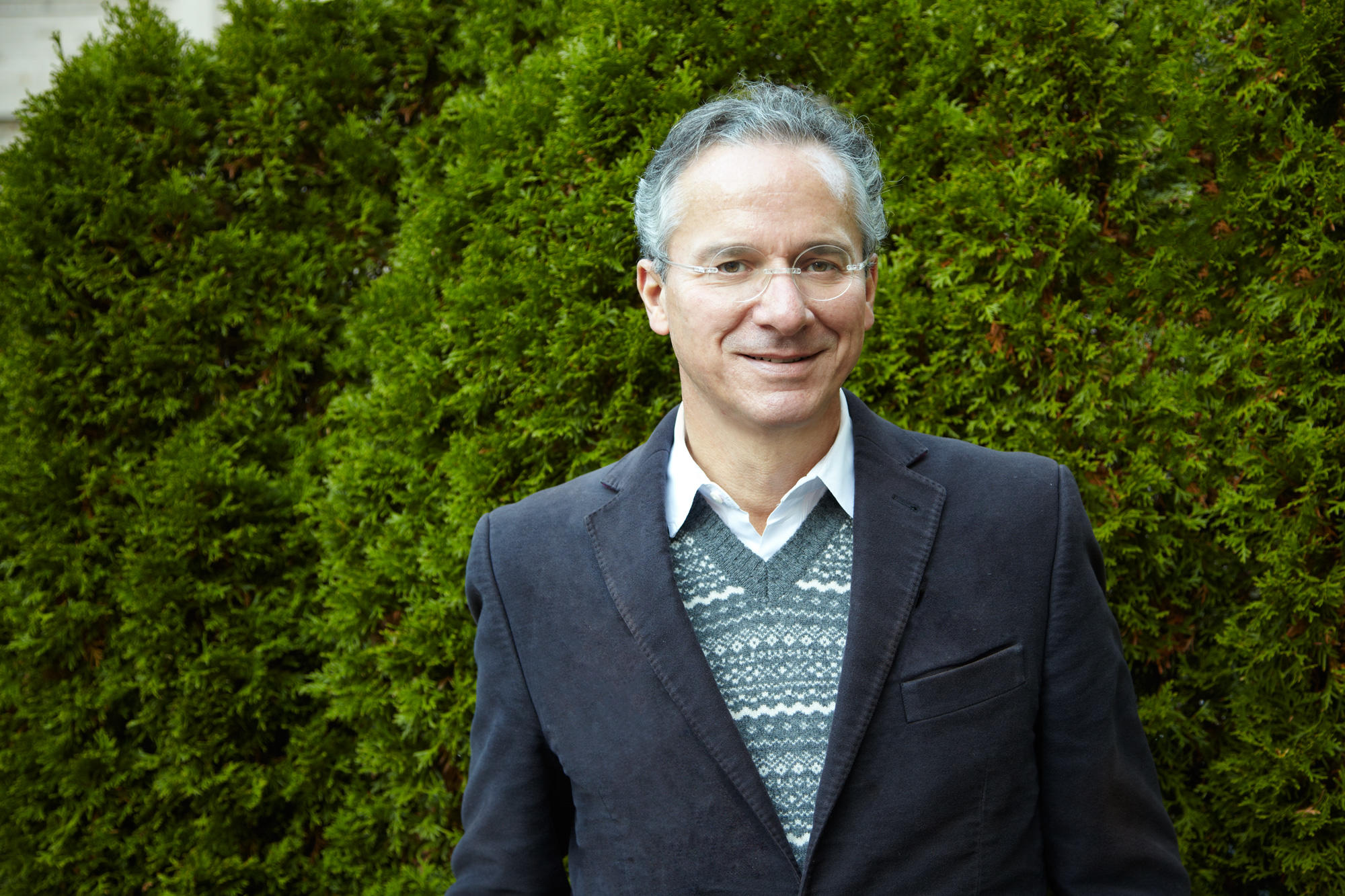
Scott Barrett, Columbia’s Lenfest–Earth Institute Professor of Natural Resource Economics, is internationally recognized for his work applying game theory to the high-stakes business of environmental-treaty negotiations. Earlier this year, as Barrett prepared to fly to Paris to attend the 2015 United Nations climate-change conference, we asked him to give us an insider’s perspective on the interpersonal dynamics behind the talks and the likelihood that nations will reach a global accord to curb emissions and address the world’s environmental challenges.
Give us the definition of your job. What does Scott Barrett do for a living?
I’m an economist who tries to explain why international cooperation is needed, and when and why it succeeds or fails. Probably the two greatest successes from modern history are the eradication of smallpox in 1979 by member states of the United Nations and the 1987 Montreal Protocol, which protected the stratospheric ozone layer. In both cases, the world cooperated flawlessly. Everyone alive today is better off because of these efforts.
Often cooperation fails. In these cases, I use the tools of social science — specifically, game theory — to show diplomats and global political leaders how cooperation can be achieved.
Recently, I’ve been working on climate change, the eradication of polio, and global overfishing. All these problems can only be solved through international cooperation.
You didn’t grow up wanting to be a game theorist?
As a child, I wanted to be a conservation biologist like George Schaller, who studied gorillas, pandas, and lions in the wild. As I grew older and read more, I decided that what I really wanted to do was not only to observe but also to protect the wildlife that remains.
In college at the University of Massachusetts at Amherst, I read the work of the American conservationist Aldo Leopold, who in 1933 wrote that basically every deer, every animal, every part of nature that we observe is there because people allow it to be there. Leopold helped me to understand that humans have the wherewithal to destroy nature, alter it, or protect it.
Reading Leopold was eye-opening. It caused me to switch my major to economics, because it seemed to me that I needed to help change how people behaved if I was to help conserve wildlife.
But why economics? If you were interested in human behavior, why not study psychology or anthropology?
Economics is concerned with the way people interact. When economists refer to markets, what they are really talking about are social interactions. Economists study individual behavior and interactions by small groups and see how they add up at the societal level. Why is there poverty? Why is there so much pollution? Economics helps to answer these big questions.
The discipline is known for explaining how, when people act only in their self-interest, the outcome can still be pretty good overall for everyone. This was Adam Smith’s great insight. But economics also explains that there are circumstances in which the pursuit of self-interest by each of us individually brings about an outcome that is bad for us collectively.
Can you give an example of this?
Sure. Let’s talk in public-health terms — vaccinations. When I decide whether or not to get vaccinated for an infectious disease, I am likely to consider only my own well-being. I am unlikely to take into account the fact that if I don’t do it, I can transmit the disease to others. That’s because if I protect others, I get no personal reward. Sometimes bad outcomes arise not because people are bad, but because they face the wrong incentives. In this case, what we economists call the market has failed to provide me with an incentive to behave in the public interest. Individual nation-states can adopt domestic policies to correct market failures like this. It’s why states usually have public-health laws.
But the same problems often get scaled up to the global level. If one country, for instance, does too little to prevent the spread of an emerging infectious disease like Ebola, other countries are put at risk.
We don’t have a world government that can change this. There are instead about two hundred sovereign states, and they can pretty much do as they like. This is why global problems like climate change, overfishing, and infectious disease can’t be addressed in the same way as national problems. Sovereignty makes cooperation necessary.
As it happens, international cooperation is normally brought about by treaties. My insight as a researcher was to see that these treaties could be modeled as games.
How exactly does that work?
By looking at a treaty as a game, we can see whether it will be effective and why. For example, will a new agreement at the upcoming United Nations climate-change conference in Paris actually cause countries to reduce their emissions? It is hard to know in advance. It will even be hard to know years after the treaty has been adopted and implemented. This is because we won’t be able to observe what countries would have done without the agreement.
Game theory allows us to see how countries might behave with and without the treaty. It is a structured way of imagining.
With Astrid Dannenberg, a former Earth Institute fellow who now teaches at the University of Kassel, in Germany, you created a laboratory-based game simulating some of the human dynamics likely to come into play in Paris. Can you describe what you did, please.
Our game is meant to capture the essence of climate change negotiations. At the real Paris meeting, nearly two hundred sovereign nations will make pledges for how much they’ll reduce their greenhouse-gas emissions. In doing so, they will be guided by their collective goal to limit global temperature change to two degrees Celsius above pre-industrial levels. That’s the ceiling that these countries have agreed is necessary to avoid what they term “dangerous” climate change.
The way our game works is that players are allotted stacks of poker chips worth a few Euros, which they can contribute to a central pot. They are at liberty to contribute as many or as few chips as they want. The cash award they get at the end of the game depends on how many chips they and their fellow players contribute. It also depends on whether the total number of chips exceeds a certain threshold that isn't disclosed to the players. At worst, a player may end up with no award; at best, he or she might get close to €40. Players get more by holding onto their chips, but if the threshold isn’t reached, nobody gets the big prize. This threshold is supposed to represent the catastrophic outcome of “dangerous” climate change. If countries contribute so little that they allow dangerous climate change to happen, the global community as a whole loses, and the biggest individual losers will be those who made a good-faith effort to save the world by contributing lots of their chips while others stood idly by, hoarding theirs.
We find that most individuals are inclined to cooperate. But when the group observes one or two players failing to contribute many chips, a kind of collective cynicism sets in, and group cooperation collapses. Then everybody loses.
How do the real climate-change deliberations in Paris fit into your laboratory scenario?
You can think of the pledges that countries will make in Paris as analogous to the pledges individuals make in our game. Pledging to reduce emissions is like pledging to contribute poker chips. In both cases, contributions are voluntary. However, one novel aspect of this new treaty is that it will make it easier for countries to review each other’s pledges and eventual contributions. Every country will be able to see whether similar countries are making comparable pledges, whether the totality of such pledges will achieve the global goal, and whether, over the coming years, the pledges made by individual countries are actually met. It will also provide an opportunity for countries to express their approval, or disapproval, of the pledges and actions of individual countries. There is optimism among diplomats, environmentalists, and other observers that this process of naming and shaming will yield better results than did previous climate treaties.
In our most recent experiment, therefore, we included new stages in the game-playing. We wanted to see how individuals would play the game if at the start they each had to announce to the group how many chips they intended to contribute, and if, over the course of the game, all the players could observe how many chips each player had contributed so far. What we found is that this affected what individuals said they would do. They did increase their pledges. But it didn’t affect what they actually did. In fact, every time we ran the simulation, the players fell short of reaching their collective goal.
These games help me understand why we’re messing up. And how we can do better.
Based on your research, what do you see happening in Paris?
I think it’s very likely that a treaty will be adopted and that it will include pledges to reduce emissions and some kind of review process. There are draft texts circulating now, and that’s what they look like. However, both the reductions and the review will be voluntary, and my research predicts that this won’t be enough to change how countries actually behave.
Let’s talk about the real world. Heading into Paris, all the world’s major economies, including the United States, China, and India, have made pledges to reduce their carbon emissions. India, whose leaders had previously said they would not accept constraints on economic development to combat global warming, was the last to do so. Will India play the role of the free rider in this negotiation?
India is preoccupied with what its leaders perceive as a historical injustice. They view the rich countries as having gotten rich by burning fossil fuels, and now they are being told not to do that. Quite legitimately, they want to develop, too. There’s tremendous poverty there. The other side of it is that India’s population, like those of many developing nations, is especially vulnerable to droughts, floods, and other types of extreme weather events that will become increasingly common as a result of climate change. If we don’t get effective limitations, India will be a very big loser.
Will a Paris treaty get the world to that two-degree-Celsius target?
According to the International Energy Agency, even if countries fulfill their Paris pledges, they’ll fall short of meeting the two-degree target. My work suggests that they may not even fulfill their pledges.
If this sounds negative, I should add that in the past many countries have made pledges and later failed to meet them. Why should things be different this time around? My reading of the draft Paris agreement is that it won’t bring about the needed change.
Why bother with it, then?
Because the consequences of failure are huge. This is why countries try again and again. They agree what they should do collectively. But the agreements they’ve reached so far do little to change the incentives they have to limit their emissions. We need to change the incentives so that countries behave differently.
My question to the Paris negotiators is this: why try the same approach — voluntary pledges — over and over again and expect a different result? We need to try other approaches.
What would you suggest instead?
The best way to address climate change may be for the countries committed to reducing emissions to shun the free riders and cooperate just among themselves. The Yale economist William Nordhaus has recently analyzed one way of doing this — forming a trade club, in which members adopt an emission-reduction policy and impose tariffs on countries that refuse to join their effort to limit climate change. However, I think this could provoke retaliation from the ostracized countries, stimulating conflict rather than cooperation.
I’ve proposed a related but somewhat different approach, wherein countries with progressive emission policies offer others a combination of carrots and sticks, perhaps to include strategic trade measures, in hopes of broadening participation. That’s how the Montreal Protocol of 1997 worked. And as I said earlier, that agreement was a great success in protecting the stratospheric ozone layer.
Your Earth Institute colleague Michael Gerrard ’72CC, the head of Columbia Law School’s Sabin Center for Climate Change Law, is going to Paris as a member of the Marshall Islands diplomatic team. Will you also be a part of any official delegation?
No, I’m going as an academic. I’ll be giving talks. There are a lot of events around the negotiations: talks, debates, panels with political leaders. The event is being compared to a medieval bazaar.
So, then, do you see the Paris meeting as just another game?
Climate change is a game — a very serious game — and Paris represents another round.
Bear in mind that Paris is the twenty-first meeting of the parties to the first climate-change treaty. That treaty was adopted in Rio in 1992. We’ve done most of what is projected for Paris before, and it didn’t work. That’s including the Kyoto accord of 1997. And moreover, my work predicted that this approach wouldn’t work because it lacked enforcement. And Paris won’t work again, because while it may incorporate a review, it will still be voluntary. My models show that human nature is such that we need something stronger.
But, fortunately, people will keep meeting and keep trying. They’re also meeting outside of this process. One meeting in particular may prove at least as important as Paris. It is being held in Dubai in November, and there, countries will try to amend the Montreal Protocol. The new amendment would phase down the emissions of HFCs, or hydrofluorocarbons, a class of powerful greenhouse gases. This amendment could make a real difference, because its obligations wouldn’t be voluntary. The Montreal treaty has been a success because, unlike the various climate-change protocols, it has enforcement mechanisms.
My advice to climate negotiators, after they recover from the Paris summit, is to look for more opportunities like this one.
Why do you do this unusual work?
Because climate change is the biggest problem the world has ever faced, the greatest challenge of our time. Why work on anything else?




